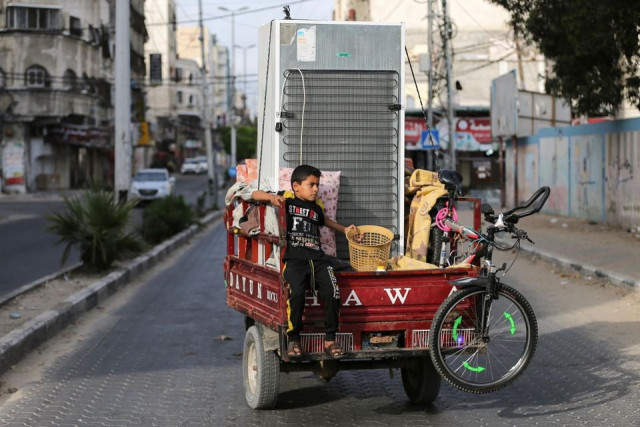Most Gaza children suffer 'distress' after 15 years of blockade: NGO
The number reporting symptoms of "depression, grief and fear," had risen from 55 percent to 80 percent

Four out of five children in Gaza suffer from emotional distress, Save the Children said Wednesday, 15 years after Israel slapped a strict blockade on the Palestinian territory.
Israel imposed the measure in June 2007, as fighters of the Islamist Hamas movement took control of the densely populated enclave. Israel, and Egypt, continue to severely restrict the flow of people and materials in and out.
In a report called "Trapped", Britain-based Save the Children said the mental health of Gazan children has continued to deteriorate.
Since 2018, the number reporting symptoms of "depression, grief and fear," had risen from 55 percent to 80 percent, the report said.
Save the Children's director for the occupied Palestinian territories, Jason Lee said: "The children we spoke to for this report described living in a perpetual state of fear, worry, sadness and grief, waiting for the next round of violence to erupt, and feeling unable to sleep or concentrate.
"The physical evidence of their distress –- bedwetting, loss of ability to speak or to complete basic tasks -– is shocking and should serve as a wakeup call to the international community," he added.
Children make up nearly half of Gaza's population of 2.1 million. Around 800,000 young people in the territory who have "never known life without the blockade," Save the Children said.
'Open-air prison'
Israel insists the blockade is necessary to protect its citizens from Hamas, a group blacklisted as a terrorist organisation by much of the West.
Israel has fought four wars with Hamas since 2007, most recently in May 2021.
Over the past 12 months, Israel has granted more work permits for Gazans seeking better paid jobs inside the Jewish state. It has also relaxed some restrictions on the flow of goods in and out of the territory.
But the blockade remains broadly unchanged, with Palestinians generally barred from leaving Gaza through the Erez crossing to Israel.
Gazans also face huge obstacles exiting through the Rafah crossing to Egypt.
In a statement marking the anniversary of the blockade, Human Rights Watch said that "Israel, with Egypt's help, has turned Gaza into an open-air prison".
HRW's director for Israel and Palestine, Omar Shakir, told AFP: "Young people face the brunt of (the blockade) because they don't know of a Gaza before the closure.
"Their horizons are forcibly narrowed to a 40 by 11 kilometre (25 by seven mile) strip of land and that prevents them from the chance to interact and engage with the world," Shakir said.



















COMMENTS
Comments are moderated and generally will be posted if they are on-topic and not abusive.
For more information, please see our Comments FAQ